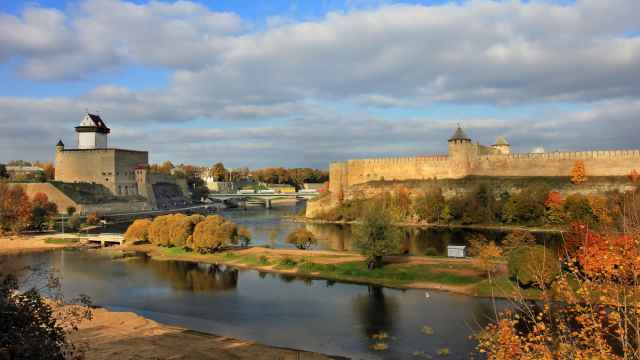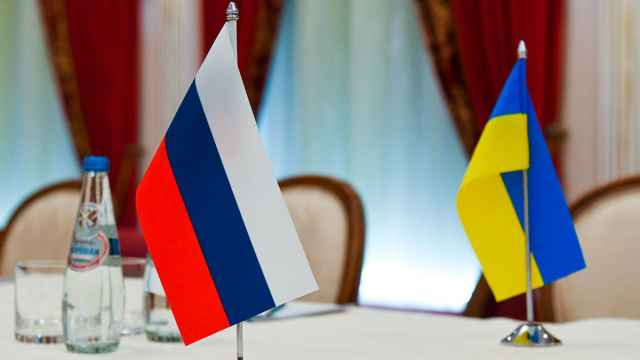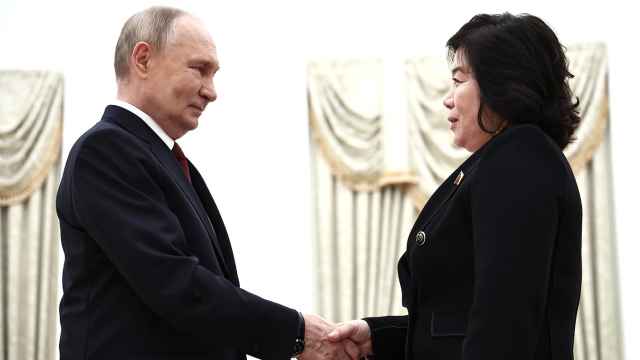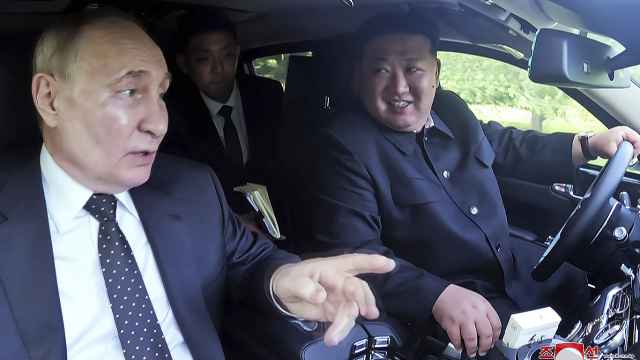One year ago Wednesday, tens of thousands of protesters filled Chistiye Prudy, a leafy park in downtown Moscow, in a spontaneous protest against State Duma elections that they said were rigged.
The participants — led by students and urban, middle-class professionals — described the event in terms of jubilation and triumph, and with good reason.
It was the largest public protest in a generation, and it launched a movement that has, over the past year, altered Russia's political landscape and shaken the regime of President Vladimir Putin.
Protest followed protest, each larger than the one before, with roaring chants of "Putin, leave!" that gave some the impression that an Arab Spring-style revolution had come to Russia.
A tumultuous year later, ahead of the next major protest, set for Dec. 15, opposition leaders and activists are counting their successes and failures and looking forward to a future that seems no more certain than it did that day at Chistiye Prudy.
"Many were confident that 100,000 people would take to the streets and the government would change. This didn't happen, though, and people became depressed," said Izabel Magkoyeva, a 21-year-old socialist activist.
Dissatisfaction with Putin and the government remains high among Moscow's educated middle-class, which fueled the protests and spread the word on social media. But the movement's leaders face a crisis of legitimacy, and divisions between them appear to be growing, especially with regard to fundamental questions of tactics.
In plain terms, the protest movement — expressed in both rallies and a sprouting of civic organizations — failed to achieve its loudest, initial goal: free and fair elections. Many activists dismissed Kremlin reforms reinstating direct gubernatorial elections and more open political party registration as half-hearted, and deplored what they saw as a crackdown beginning in May, the same month Putin took office for a third term as president.
But protest activists, leaders, and analysts interviewed by The Moscow Times describe a silver lining best described by the oft-used expression "Russia has woken up."
"It was a declaration that we want to be citizens, that we want to have a say," said Moscow Carnegie Center analyst Masha Lipman.
Emphatic Start
The protest movement began in December 2011, following Duma elections on Dec. 4 widely viewed as unfair, with calls for a re-vote, and spread into a cry for comprehensive reform of the political system. The protest on Dec. 5 on Chistoprudny Bulvar unexpectedly drew thousands of people, who then marched through central Moscow chanting "fair elections."
The year was punctuated by a series of mass protests that drew tens of thousands, many wearing the newly adopted opposition symbol of a white ribbon.
"I'm happy," opposition politician Boris Nemtsov said shortly after a Dec. 10 rally on Bolotnaya Ploshchad. "We couldn't have even dreamed about this a week ago."
Many considered the largest rally to have been on Dec. 24 on Prospekt Akademika Sakharova, when the column of protesters waving flags and holding banners and balloons stretched as far as the eye could see.
But officials dismissed their calls for new elections, and then-Prime Minister Putin insulted protesters by saying on national TV that he initially mistook their white ribbons for condoms.
Two more large protests were held in February and March, when the calls for new elections were supplemented by those calling for Putin to leave power, an end to widespread government corruption, and the freeing of so-called political prisoners.
While the movement failed to achieve these goals, activists said it sparked a burst of civic awareness and activism.
"Many who had never thought seriously about their political orientation started to recognize themselves as political subjects," Magkoyeva said.
Activists and leaders point to a surge of people, many of them young people, who volunteered to monitor the March presidential elections and were credited with reducing fraud. Others, like professional poker player Maxim Kats and Moscow State University journalism student Vera Kichanova, ran and won seats on Moscow municipal councils, a formerly ignored institution.
Opposition supporters also showed a willingness to drop everything and travel for their beliefs — first to support Astrakhan mayoral candidate Oleg Shein's attempt to overturn contested election results, and later to support flood victims in the southern city of Krymsk.
Civic activism appeared to reach a peak during Moscow's brief Occupy-style movement over the summer, when hundreds of mostly young activists camped out on city squares and formed self-governed spaces that also served as a platform for political discussions and self-expression.
At the initiative of former President Dmitry Medvedev, tentative reforms were passed, including the return of direct gubernatorial elections and changes to legislation making it significantly easier to register political parties, but the protests continued.
A Violent Turn
Then on May 6, the eve of Putin's presidential inauguration, a tense lull in the protests was shattered when bloody clashes broke out between protesters and riot police, resulting in more than 400 detentions and dozens injured.
In subsequent months, protest leaders' homes and offices were searched and about twenty activists were implicated for their alleged role in the clashes. Laws were also passed tightening rules on public demonstrations, defamation, and NGOs that conduct "political activity" and receive foreign funding.
The Kremlin accused some NGOs of working on behalf of meddlesome foreign forces, such as the U.S. State Department. The government also kicked out the U.S. Agency for International Development, or USAID, which gave grants to vote monitor Golos, human rights watchdog Memorial and others.
The government appeared to team up with Russian Orthodox Church head Patriarch Kirill to push for a harsh sentence for members of female punk band Pussy Riot, accused of inciting religious hatred for a lewd, anti-Putin performance in a Moscow cathedral in February that led to the trial of the year and prison sentences for two of the women.
Gennady Gudkov, one of a handful of State Duma deputies who sided with the protesters, was cursed by a colleague and stripped of his seat in parliament, ostensibly for illegal business dealings.
The government's conservative tack, which ranged from bolstering the Orthodox Church to promoting anti-gay laws and neighborhood patrols by pro-government Cossack volunteers, can also be seen as a reaction to the protest movement, said Lipman of the Carnegie Center.
"If [the protesters] are unpatriotic, then the government is forced to define what it stands for, and what 'good, patriotic Russians' stand for. This inevitably pushed the government to social and political conservatism," she said.
The mood among opposition supporters was noticeably more grim in September, when an event dubbed the "March of Millions" drew fewer people than previous demonstrations, and apathy appeared to spread after United Russia candidates swept October gubernatorial elections, the first in seven years.
Prominent opposition figures, such as environmental leader Yevgenia Chirikova and blogger Ilya Varlamov, were defeated in mayoral elections.
"… faced with reality, first on the federal and then on the regional level, leaders of the protesting groups suffered a fiasco," crowed conservative political analyst Alexei Mukhin in an article in Nezavisimaya Gazeta on Friday in which he declared the failure of the protest movement.
Abiding Divisions
Recent months have seen the formation of a unified Coordination Council for the opposition, and several political parties, including one with close links to anti-corruption crusader Alexei Navalny, arguably the opposition's most popular leader, are set to launch this month.
But still, the movement's leaders seem divided over tactics and slogans, and activists were less bullish ahead of the movement's anniversary and the next scheduled demonstration.
An exchange at the start of the Coordination Council's first meeting on Oct. 27 seemed to confirm this, when leftist leader Sergei Udaltsov cursed out fellow council member Maxim Kats and threatened to quit the group after Kats motioned to table a discussion about the next rally due to lack of time.
"The main achievement of the protest movement was the ability to work together. Now the disagreement is so obvious that even Mikhail Khodorkovsky stated it in his letter to the council," said Duma Deputy and opposition leader Ilya Ponomaryov, referring to an online letter in which the imprisoned billionaire implored opposition leaders to stay united.
Ponomaryov is one of many leaders who have derided the creation of the council, which he described as a step back that will "ultimately lead to regression."
"The circle has been closed — we are standing exactly where we were a year ago," he said.
Though the council was elected via an ostensibly democratic online election, accusations from across the political spectrum have tarred its members as "self-appointed" leaders.
"It seems to me that that urban, educated middle-class never received political representation," said Yury Saprykin, editorial director of Rambler-Afisha, whose publications include Afisha, an entertainment magazine popular among affluent, young professionals. Saprykin co-organized early rallies but later decided to stop mixing journalism with politics.
"Those parties that are now registered and even those people who were elected to the council are very often not perceived as trustworthy leaders," he said.
Leaders as diverse as Sergei Mitrokhin of the liberal Yabloko party, and nationalist Dmitry Dyomushkin have rejected the idea of more street protests, which Navalny and others say are an essential and highly effective form of opposition.
"What's the sense in going out and saying, 'Putin, leave! Putin, leave!'? He hasn't left yet. Not even Churov has left," Dyomushkin said, referring to Central Elections Commission chief Vladimir Churov, a widely loathed figure among protesters.
Dyomushkin said the government would have to make a major mistake, such as by imprisoning an opposition leader, for the balance of power to shift back to protesters.
Some opposition figures including TV host Ksenia Sobchak favor dialogue over hissing denunciations of Putin and others. Even Udaltsov, who cultivates the image of a street brawler and seems at home in the back of a police van, has said he wants dialogue and compromise, not revolution.
Magkoyeva, who is a member of the May 6 Committee that supports people suspected by authorities of participating in violence at the May 6 rally — people she and many opposition activists call political prisoners — compares dialogue with the government to treason.
"I don't know what kind of 'dialogue' there can be when our comrades are behind bars, when there are so many political prisoners in Russia. I think it's a betrayal of the thousands of people who took to the streets this year, a betrayal of those who are in prison right now," she said.
Ponomaryov favors a balance of street protests and activities such as party building. "Systemic activities are not possible if there is no pressure from the street, and vice versa," he said.
Public Ambivalence
Polls suggest that the protest rallies have not failed to gain support from most Russians.
In December 2011, 44 percent of those surveyed in a Levada Center poll either strongly or moderately supported the rallies. But in October 2012, only 30 percent felt the same way, according to another survey by the independent pollster. That month, only 15 percent of those surveyed said they were willing to participate in a protest rally.
Lipman described the protests as ultimately a Moscow phenomenon that had its roots in the post-industrial culture.
"Moscow is such a different place in every sense. It's a post-industrial economic center. These economies produce a constituency that is more independent, more independently minded, more exposed to the global world, with a better command of new technologies," she said.
Lipman said she wouldn't describe the protesters as a challenge to the government monopoly on power, but a factor that will contribute to the eventual "pluralization" of Russian life.
"I would not even talk about democratization, but of acceptance of the fact that people are diverse, that Russia has outgrown the paternalistic model of an omnipotent state and powerless society. … That in fact there can be political competition," she said. "This is not necessarily a pretty process."
Dissatisfaction with the government and the country's direction, however, remains high, suggesting that there's fertile ground for the opposition.
Fifty-nine percent disapprove of the performance of the Russian government, and 65 percent disapprove of the performance of the State Duma, according to Levada Center polls published last month.
Putin's approval rating stands at 63 percent, which is high by Western standards, but it amounts to his lowest rating since June 2000 and follows a steady decline from an all-time high of 88 percent in September 2008.
Predictions for the future of the protest movement are varied, but most say the dissatisfaction that created it hasn't gone away.
"As political and economic crises escalate, the protest movement will strengthen. But the protest won't be so liberal anymore — we should expect it to be more nationalist or more leftist," independent political analyst Pavel Salin said.
Udaltsov insisted that the opposition's future consisted of searching for the right tactics — preferably street-based — to force the government to the negotiating table.
Opposition leader Ilya Yashin said the movement will seek to put forth viable candidates in next year's elections in Moscow and the Moscow region — and to achieve a grander goal.
"It's impossible to make political prognoses in Russia. But our aim is to do everything possible to change who's in the Kremlin by Dec. 2013," he said.
Yekaterina Kravtsova contributed reporting.
Related articles:
A Message from The Moscow Times:
Dear readers,
We are facing unprecedented challenges. Russia's Prosecutor General's Office has designated The Moscow Times as an "undesirable" organization, criminalizing our work and putting our staff at risk of prosecution. This follows our earlier unjust labeling as a "foreign agent."
These actions are direct attempts to silence independent journalism in Russia. The authorities claim our work "discredits the decisions of the Russian leadership." We see things differently: we strive to provide accurate, unbiased reporting on Russia.
We, the journalists of The Moscow Times, refuse to be silenced. But to continue our work, we need your help.
Your support, no matter how small, makes a world of difference. If you can, please support us monthly starting from just $2. It's quick to set up, and every contribution makes a significant impact.
By supporting The Moscow Times, you're defending open, independent journalism in the face of repression. Thank you for standing with us.
Remind me later.






